Module 5 Unit 9 Was I a good girl back then? 课件(共67张PPT)
文档属性
| 名称 | Module 5 Unit 9 Was I a good girl back then? 课件(共67张PPT) |
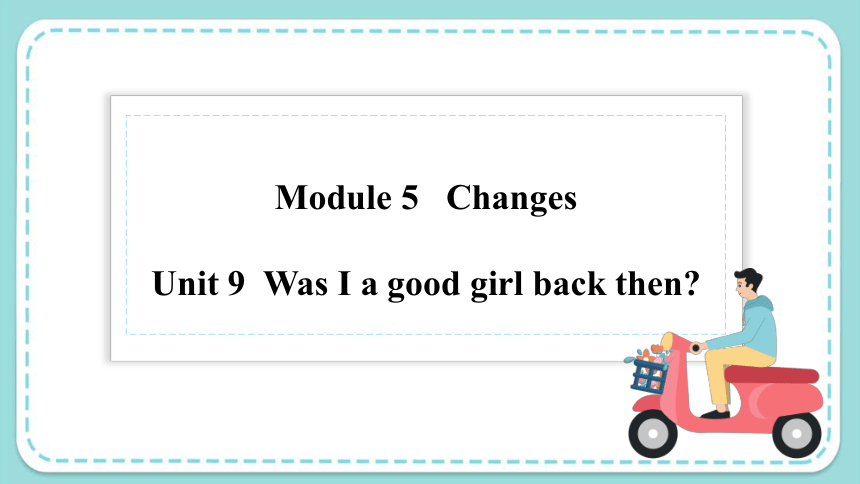
|
|
| 格式 | pptx | ||
| 文件大小 | 10.3MB | ||
| 资源类型 | 试卷 | ||
| 版本资源 | 教科版(广州) | ||
| 科目 | 英语 | ||
| 更新时间 | 2023-12-14 20:36:09 | ||
图片预览

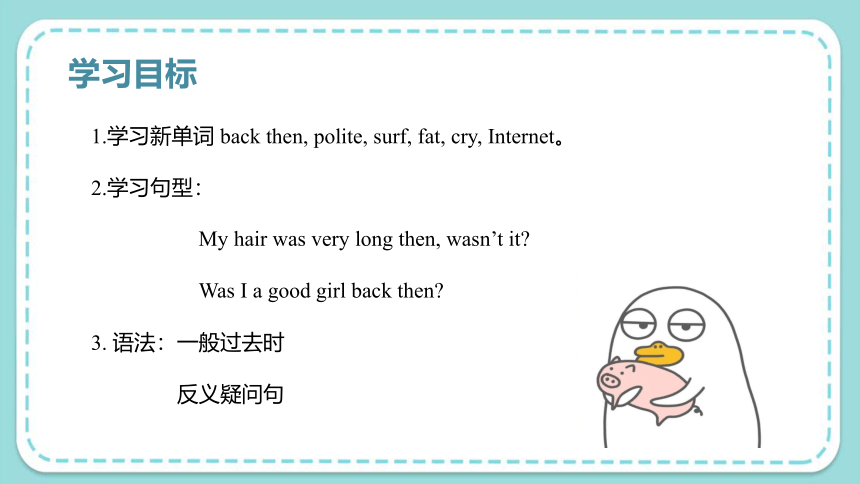
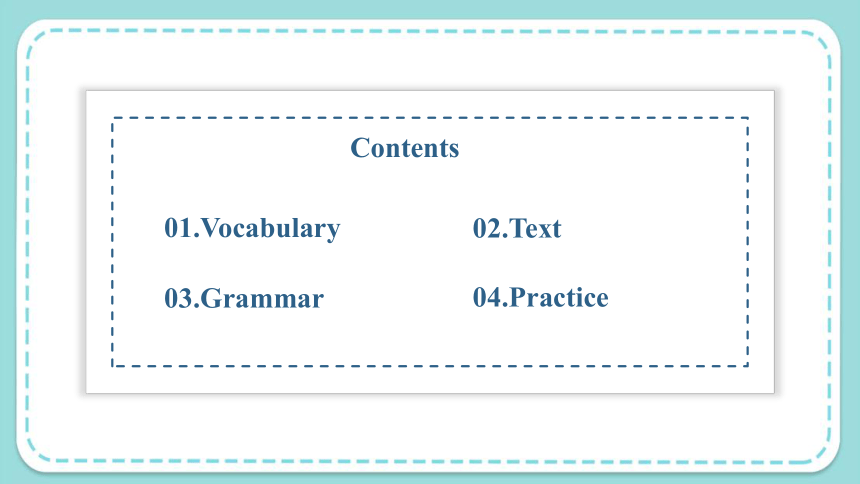
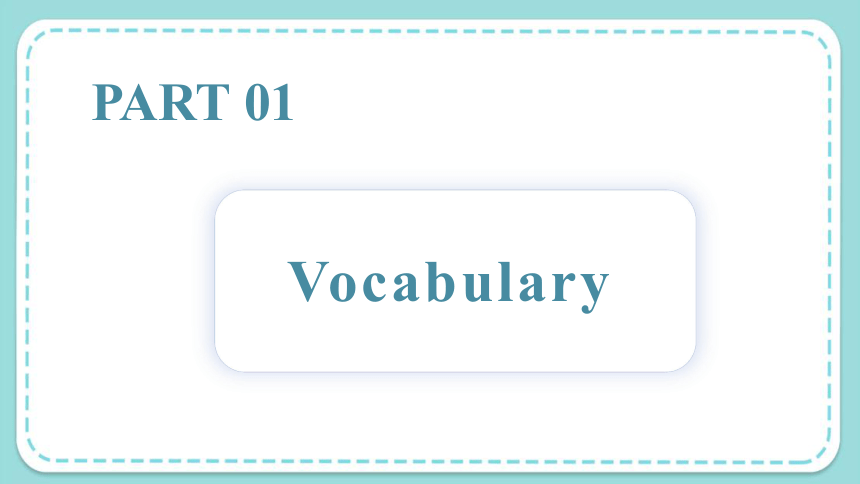
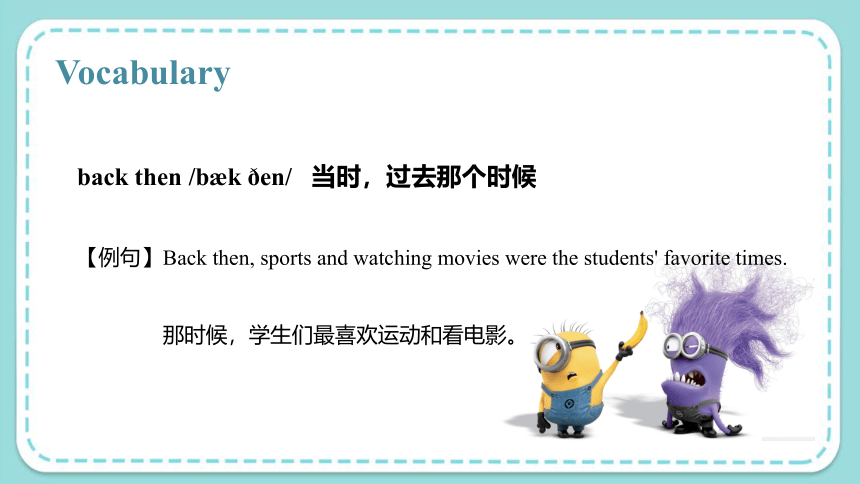
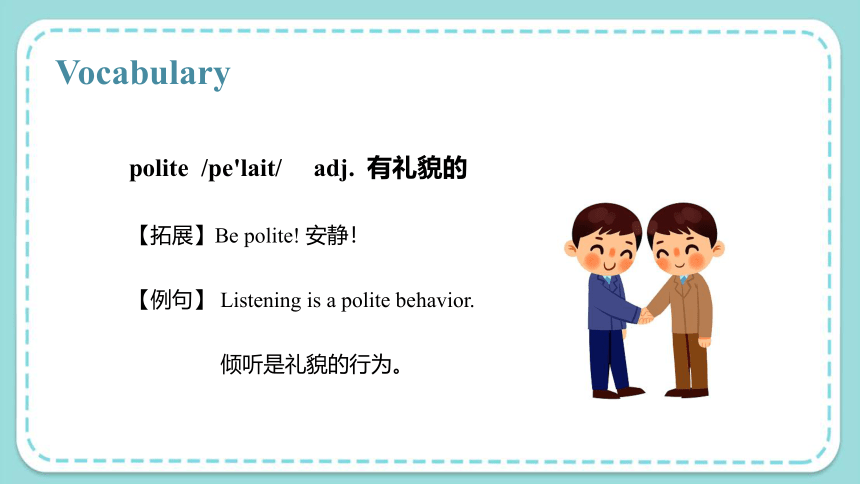
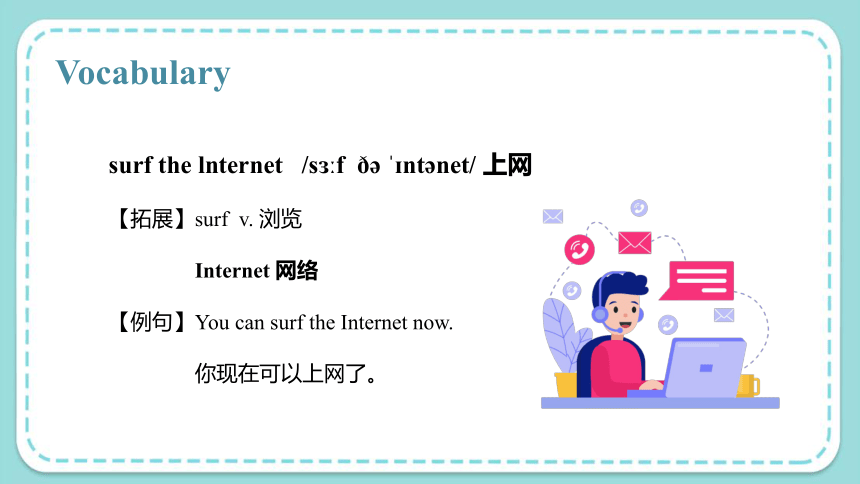
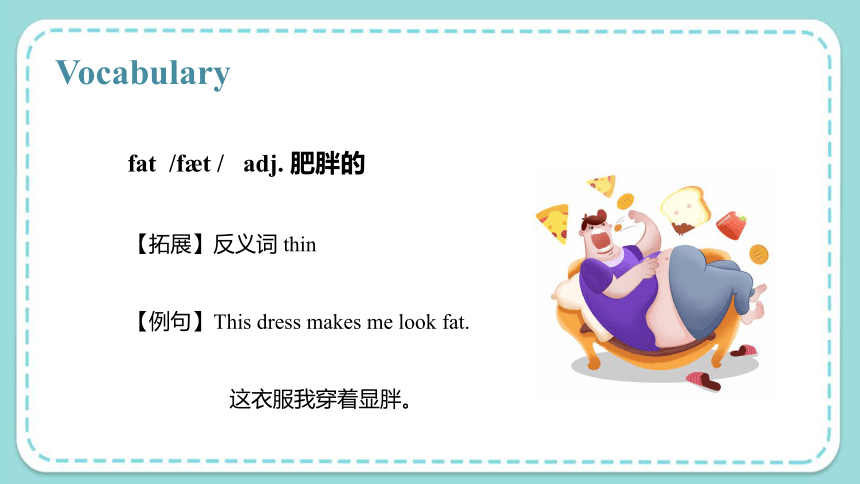
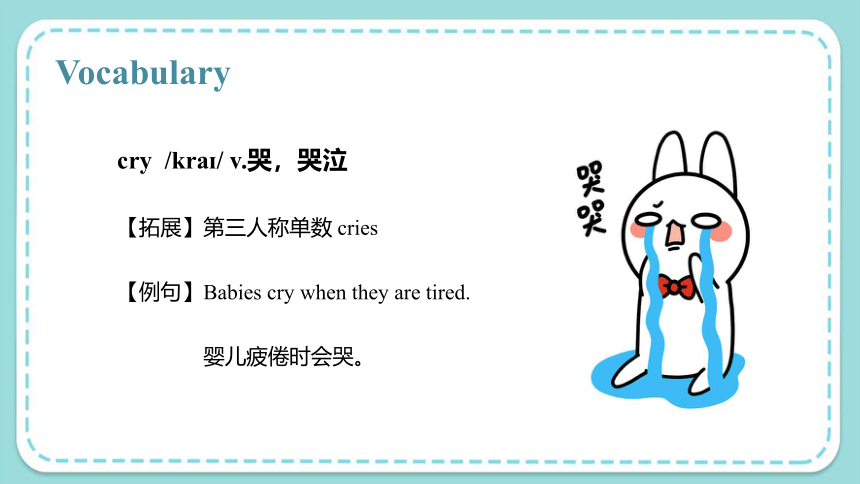
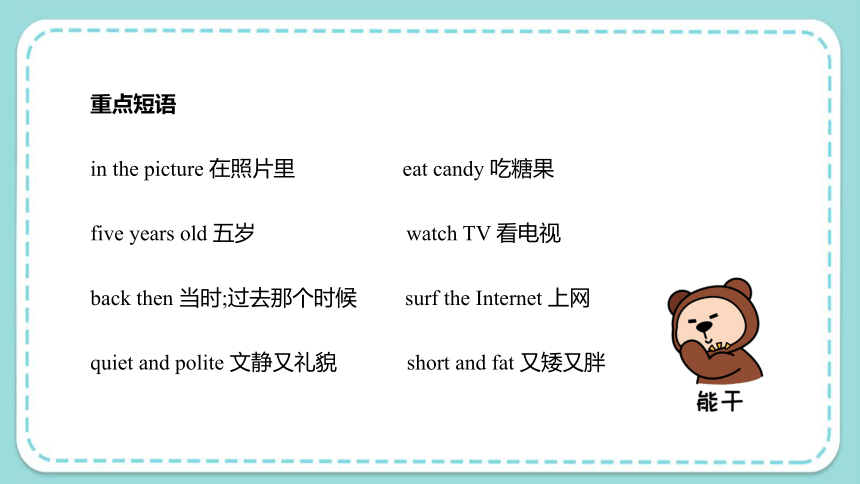
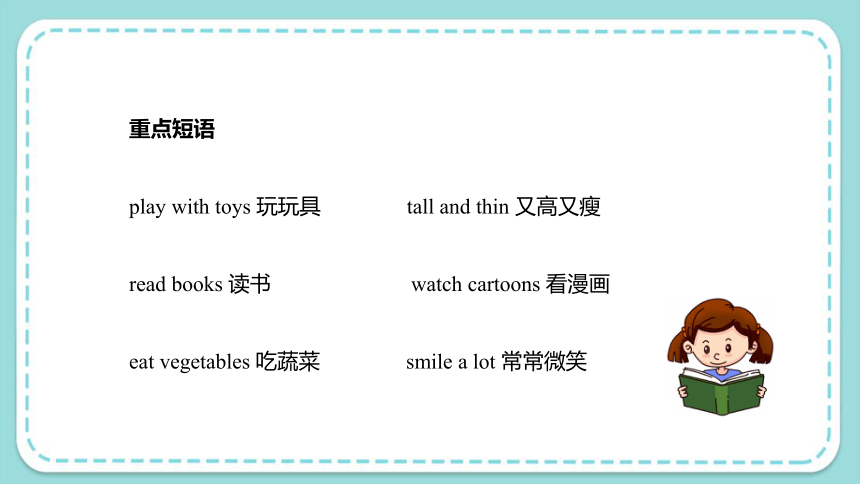
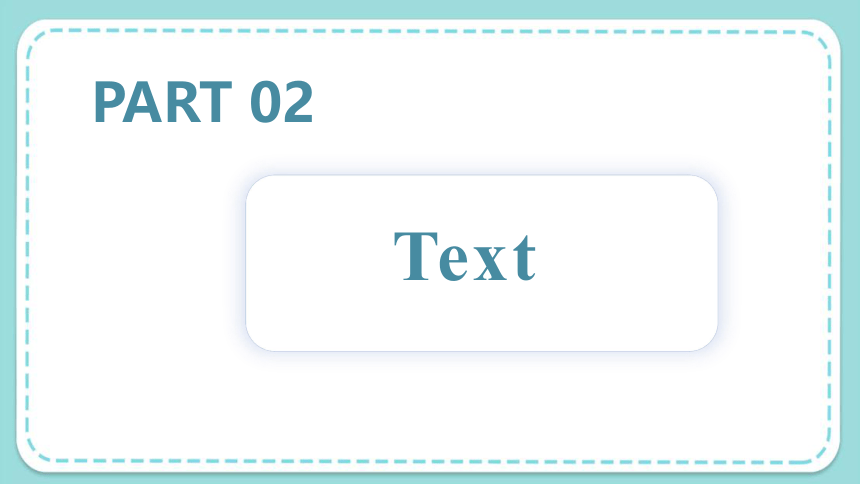
文档简介
(共67张PPT)
Module 5 Changes
Unit 9 Was I a good girl back then
学习目标
1.学习新单词 back then, polite, surf, fat, cry, Internet。
2.学习句型:
My hair was very long then, wasn’t it
Was I a good girl back then
3. 语法:一般过去时
反义疑问句
Contents
01.Vocabulary
02.Text
04.Practice
03.Grammar
行业PPT模板http:///hangye/
PART 01
Vocabulary
Vocabulary
back then /b k en/ 当时,过去那个时候
【例句】Back then, sports and watching movies were the students' favorite times.
那时候,学生们最喜欢运动和看电影。
Vocabulary
polite /pe'lait/ adj. 有礼貌的
【拓展】Be polite! 安静!
【例句】 Listening is a polite behavior.
倾听是礼貌的行为。
Vocabulary
surf the lnternet /s f nt net/ 上网
【拓展】surf v. 浏览
Internet 网络
【例句】You can surf the Internet now.
你现在可以上网了。
Vocabulary
fat /f t / adj. 肥胖的
【拓展】反义词 thin
【例句】This dress makes me look fat.
这衣服我穿着显胖。
Vocabulary
cry /kra / v.哭,哭泣
【拓展】第三人称单数 cries
【例句】Babies cry when they are tired.
婴儿疲倦时会哭。
重点短语
in the picture 在照片里 eat candy 吃糖果
five years old 五岁 watch TV 看电视
back then 当时;过去那个时候 surf the Internet 上网
quiet and polite 文静又礼貌 short and fat 又矮又胖
重点短语
play with toys 玩玩具 tall and thin 又高又瘦
read books 读书 watch cartoons 看漫画
eat vegetables 吃蔬菜 smile a lot 常常微笑
PART 02
Text
Let's talk
Xiaoling: Mum, who is that in the picture
Mum: That's you, when you were five years old.
Xiaoling: Really My hair was very long then, wasn't it
Mum: Yes, it was. Before, you liked long hair very much, but now you always keep it short.
Xiaoling: Was I a good girl back then
Mum: Oh yes, a very good girl. When you were five, you were very quiet and very polite. But now...
Xiaoling: But now But now I am still very good!!
Let's talk
【重点考点一】
Who is that in the picture 照片里的那个人是谁?
in the picture 在照片里
e.g. Who is that boy in the picture
【重点考点二】
That’s you, when you were five years old. 那是你,那时你五岁。
注意:when意思为:___________________
拓展:five years old意思为:___________________;
five-year-old意思为:___________________.
She is five years old. She is a five-year-old girl.
【重点考点二】
① five-year-old 五岁的
( five-year-old 是合成形容词,一般要用连字符号连接,而且year也不用复数形式 )
如 He is a five-year-old boy.
②five years old 五岁 ( five years old 本身完整,不能再接名词了)
如 He is five years old.
【练一练】1. He was only then. 当时他才五岁。2. I have got a daughter. 我有个五岁的女儿。3. He has a son. 他有个七岁的儿子4. His son is . 他儿子六岁了。5. He has an daughter. 他有一个11岁大的女儿。
【重点考点三】
反义疑问句, 即附加疑问句
My hair was very long then, wasn’t it
(1)本句是反义疑问句, 即附加疑问句。它表示提问人的看法,没有把握,需要对方证实。
(2)反义疑问句由两部分组成:前一部分是一个陈述句,后一部分是一个简短的疑问句,两部分的人称时态应保持一致。
【重点考点三】
(3)陈述部分和疑问部分要么前肯后否,要么前否后肯。
(4)这类反义疑问句有时带有感彩,表示惊奇,愤怒,讽刺,不服气等。
e.g 1. She is hungry, isn’t she 她饿了,不是吗?
2. He likes the book, doesn’t he 他喜欢那书,不是吗?
3. You often take exercise, don’t you 你经常锻炼身体,不是吗?
【重点考点三】
1. She is beautiful, _______ _______? 她长的很漂亮,不是吗?
2. He is good at study, _______ _______ 他学习很好,不是吗?
3. You were in Shenzhen yesterday, _______ _______
你昨天在深圳,不是吗?
4. You liked long hair before, _______ _______
你以前喜欢长头发,不是吗?
【重点考点四】
But now you always keep it short.
Keep在这里意思是“保持”,后面常加形容词,表示保持某种状态。
如:keep quiet 保持安静 keep warm 保暖
keep the door open 让门开着 keep the room clean 房间保持整洁
保持冷静_____________________ 保持健康_____________________
保持开心_____________________
【重点考点四】
But now you always keep it short.
拓展:(1) 保持做某事:keep doing sth.
(2)保有;持有:I keep her letters.
(3)饲养,喂养:We keep some goats.
Fun with language.
Look and say.
Who am I
When I was young, I was ugly, with a tail and no legs. I was like a small fish with a big head, and my body was black. I lived in a small pond with my many brothers and sisters. I could swim, but I wasn't very happy because I didn't know who my mum was.
Now I'm fit and strong. And my body is green. I like to swim and jump around the pond and play with my friends. We have a lot of fun, and we sing beautiful songs in summer.
Read and guess.
Look and write.
Tom was a _______ boy when he ______ five years old. He had a lot of _______. He also liked watching _______ on TV. But now he is 11. He ______ tall now. Helikes playing ________. He doesn't watch so many cartoons any more. He likes to ________ cartoons now.
toys, cartoons, is, happy,
football, draw, was
Sing along.
London Bridge is falling down
London Bridge is falling down,
Falling down, falling down.
London Bridge is falling down,
My fair lady.
Word family
Read the sentences and see how the blue words are used.
(1) There is some water in the glass.
Please water the flowers.
(2) Answer my questions.
His answer is right.
(3) That skirt is too short for you.
I have a pair of brown shorts.
(4) Look at the picture. It's beautiful.
May I have a look
Word family
Read the sentences and see how the blue words are used.
(5) It rains quite often here.
It's a heavy rain.
(6) What's the time
How many times did you come here
(7) It's cool here in autumn.
The man looks cool.
(8) There's a boat on the lake.
They're boating on the lake.
Use the blue words to complete the sentences and tell their meanings.
(1) Open the windows and air the room.In the countryside, there is a lot of fresh _______.
(2) Please wait. I'll warm the soup. The weather is very _______ today.
Use the blue words to complete the sentences and tell their meanings.
(3) Don't park your car here.I play in the ________ every day.
(4) There is a toilet on the second floor.The kitchen _______ is very wet.
Use the blue words to complete the sentences and tell their meanings.
(5) The men are farming in the fields. My uncle works on a________ .
(6) The child always hands in his homework on time. I have two strong _________.
PART 03
Grammar
一般过去时
定义:过去某一时间发生的“动作”或存在的“状态”。1. He was excited yesterday. 主、系、表2. He telephoned me four times yesterday. 主、谓、宾3. He took a cake and ate it quickly. 主、谓、宾
时间标志词1. yesterday系列: the day before yesterday前天,
yesterday morning (afternoon, evening…)2. last系列: last week (month, night …) 提示:yesterday evening与last night 区别记忆方法:长长—短短。yesterday, evening 两个单词均较长,last, night 两个单词都较短。3. … ago系列: two years ago, three hours ago…4. in+过去时间点系列: e.g. in 2002 in the past(在过去)5. just now(刚才)
句式构成:
1.有”be”:“主+系+表”的结构 (先回顾一般现在时)
肯:主语+be(was, were)+表…。
否:主语+be(was, were)+not+表…。
疑:Was/Were +主+表…?
答:肯:Yes, 主+ was/were. 否:No, 主+wasn’t /weren’t.
Grammar
解析:1)be的过去式:am / is — was, are — were.
2)was not = wasn’t were not = weren’t
e.g. 肯:He was very busy last night.
否:______________________________
疑:______________________________
Yes, he _______. No, he _______.
动词原形 am am not is isn’t are aren’t
动词过去式 was wasn’t was wasn’t were weren’t
1. She _______ happy yesterday.
2. It _________ (be) Ben's birthday last Friday
3. The little dog _____ two years old this year.
4. It ____ (be) the 2nd of November yesterday.
5.They _______ glad to see each other last month.
6.他那时不在家._______________________________________ ____
2.无“be”:“主+谓+宾”结构(先回顾一般现在时)
He studied English yesterday.
否定:—______________________________.
一般疑问:—______________________________
特殊疑问:—______________________________?
肯:构成:主+动词的过去式+宾+…。
否:构成:主+didn’t+V原+宾…。
口诀:did 是个“照妖镜”,后面动词“现”原形。
口诀:助动词do /does/did后的动词要求“恢复原形”。
一般过去时的助动词为did.
1) 无be无情必加“助”。一般过去时的助动词为do 的过去式did.后面加+not.
2)在didn’t后,原句中动词由过去式应“恢复原形”。(切记)
3) did not = didn’t
口诀:助动词do /does/did后的动词要求“恢复原形”。
疑:Did+主+V原+宾…?
答:肯:Yes, 主+did. 否:No, 主+didn’t.
He studied English yesterday. — Did he study English yesterday
Yes, he did. No, he didn’t.
动词变化
“规则动词”的“过去式” 变法:口诀:直、去、双、变。
1.直:直接+ed:
looked ,played, visited; passed, joined, planted, needed.
2.去:以不发音的e结尾去e+ed:
used, changed, typed, prepared, arrived, phoned, shaved, lived, hoped, moved, closed, improved,saved, smiled, danced, decided, baked; agreed.
动词变化
“规则动词”的“过去式” 变法:口诀:直、去、双、变。
3.双:以重读闭音节双写词尾字母+ed:
stopped , planned,dropped, skipped, nodded, slipped; preferred, regretted,
4.变:以辅音字母+y 结尾,变y为i +ed:
studied, emptied, carried, tried, worried, hurried, married.
反意疑问句
① My hair was very long then, wasn’t it
② Amy can’t play the piano well, can she
反义疑问句:1.前面为陈述句,后面为简短的一般疑问句。2.前面肯定;后面否定;前面否定,后面肯定。
有be用be, 有情用情, 无be无情求助动词。3.陈述句和反问部分时态一致,问句部分用人称代词主格。
注意:疑问句部分的“主语”要用 主格 。
反义疑问句的回答: 回答按实际 。
无论是“My hair was very long then, wasn’t it ”还是“My hair wasn’t very long then, was it ”回答是一样的,如果“是长头发”统一回答“Yes, it was.” 如果“不是长头发”统一回答“No, it isn’t. ”
注意点:
1.There is a book o the desk, isn’t there
(there be句型的反问部分主语用:there)
2.祈使句的反义疑问句:
Let’s go, shall we (含Let’s 的祈使句,反问用shall we; 其他都用will you)
Let us go, will you
Open the door, will you
Don’t open the door, will you
3.陈述句有:hardly, seldom, never, no, neither, none,
nothing nobody, little, few等否定词时,反问部分用肯定句。
如:Tom is never late for school , is he
完成下列反义疑问句。
(1) He didn’t stay at home, ____________________
(2) He is swimming fast, ____________________
(3) Mike cleans his room every day, ____________________
(4) She didn’t watch TV just now, ____________________
(5) The children can’t pick flowers, ____________________
(6) He will go on a trip to Hong Kong, ____________________
2. Let us have a rest, __________
A. will you B. shall we C. do you D. don’t we
3. Don’t eat too much, __________
A. will you B. don’t you C. do you D. can you
4. There aren’t many children in the party, __________
A. aren’t there B. are they C. are there D. aren’t there
PART 04
Practice
翻译下列短语。 1. play with toys__________________2. eat vegetable___________________ 3. read books_____________________4. surf the Internet_______________5. watch cartoon_______________
根据提示完成句子。 1. 照片上是谁?_________________ in the picture 2. 以前你很喜欢长发。 __________________________________3. Was I a good girl back then ____________________________________4. 你是个好女孩。 ______________________________ . 5. You are very quite and very polite.__________________________________________
找出每组单词中不同类的一项,并把其字母编号写在相应的括号内。
( )A. am B.is C.were D.are
( )A.first B.twenty-five C.eighth D.third
( )A. studies B.worked C. played D.went
( )A.yours B. my C.mine D.ours
( )A. Monday B. Sunday C. November D.Wednesday
首字母填空
1. There is a c in his bedroom.2. You can see a c on the wall.3. In the garden, we grow some b flowers.4. We take a s in the bathroom.5. A girl is o the boy.6. There are f desks in our classroom.
写出下列动词的过去式
1. play________ 2.go_________ 3.cook_________ 4.does__________ 5.help_________ 6.see__________ 7.have_________ 8.mark__________ 9.feel___________ 10.wash__________
选出正确的答案。
( )1.There are many books on the desk. Which book does Lucy like
A.much B. better C.best
( )2.What is Li Lei going to do
A. next week B. last week C. the week
( )3.He_________ to school from Monday to Friday.
A.go B. goes C.going.
( )4.What was _________ yesterday A. that day B. the date C.day( )5.Is it ________ turn A. I B. you C.your( )6.What _______ your old school_____? A.did, look B. was, like C.did, like
( ) 7.The students in America have _______ homework than us. A. much B.less C.little( )8.I often help my mum _______ the food in the evening. A.cook B.cooking C.cooked( )9.There isn’t ________ in the house. A.anybody B. somebody C.everybody( )10.English is different _________ Chinese. A.to B. from C. at
读句子,把相应答语的编号写在句子前的括号中。
⑴Did you wash the dog yesterday ( )
⑵Where did you go this morning ( )
⑶Whose picture is this ( )
⑷Who is calling ( )
⑸Were you at home yesterday ( )
A. I had a cold and I stayed at home.B. This is Janet here. C. Yes,I did. It was very dirty.D.No,I wasn’t. I was at school.E. It’s mine. I painted it yesterday.
连词成句。
1.date,the , was, what, yesterday ____________________________
2.it, good, really, was.________________________________
3.what, yesterday ,you, did, do _____________________________
4.home, how, you, will,get ______________________________
5.like, was, it what ________________________________
阅读下面短文,然后回答问题。
I have a good friend. His name is Titi. He is from Canada. His father works in a hospital. He is a doctor. He goes to work by car..
His mother is a nurse. She works in a hospital, too. She goes to work by bus. Titi and his brother are twins. They look the same, but they are very different. Every morning, Titi goes to school by bike, but Kiki goes to school on foot. Every evening, Titi does his homework. His brother Kiki watches cartoons on TV. Titi usually plays football on Saturday. Kiki usually play computer games.
( )1. What does his father do
A. teacher B. nurse C. doctor
( )2. How does Kiki go to school
A. On foot B. By bike C. By bus
( )3. Does Titi read newspapers every evening _______.
A. No, he doesn’t B. Yes, he does. C. Yes, he is.
( )4. What does Titi usually do on Saturday
A. He usually plays football on Saturday.
B. He usually makes kites on Saturday.
C. He usually watches TV on Saturday.
Thank you!
Module 5 Changes
Unit 9 Was I a good girl back then
学习目标
1.学习新单词 back then, polite, surf, fat, cry, Internet。
2.学习句型:
My hair was very long then, wasn’t it
Was I a good girl back then
3. 语法:一般过去时
反义疑问句
Contents
01.Vocabulary
02.Text
04.Practice
03.Grammar
行业PPT模板http:///hangye/
PART 01
Vocabulary
Vocabulary
back then /b k en/ 当时,过去那个时候
【例句】Back then, sports and watching movies were the students' favorite times.
那时候,学生们最喜欢运动和看电影。
Vocabulary
polite /pe'lait/ adj. 有礼貌的
【拓展】Be polite! 安静!
【例句】 Listening is a polite behavior.
倾听是礼貌的行为。
Vocabulary
surf the lnternet /s f nt net/ 上网
【拓展】surf v. 浏览
Internet 网络
【例句】You can surf the Internet now.
你现在可以上网了。
Vocabulary
fat /f t / adj. 肥胖的
【拓展】反义词 thin
【例句】This dress makes me look fat.
这衣服我穿着显胖。
Vocabulary
cry /kra / v.哭,哭泣
【拓展】第三人称单数 cries
【例句】Babies cry when they are tired.
婴儿疲倦时会哭。
重点短语
in the picture 在照片里 eat candy 吃糖果
five years old 五岁 watch TV 看电视
back then 当时;过去那个时候 surf the Internet 上网
quiet and polite 文静又礼貌 short and fat 又矮又胖
重点短语
play with toys 玩玩具 tall and thin 又高又瘦
read books 读书 watch cartoons 看漫画
eat vegetables 吃蔬菜 smile a lot 常常微笑
PART 02
Text
Let's talk
Xiaoling: Mum, who is that in the picture
Mum: That's you, when you were five years old.
Xiaoling: Really My hair was very long then, wasn't it
Mum: Yes, it was. Before, you liked long hair very much, but now you always keep it short.
Xiaoling: Was I a good girl back then
Mum: Oh yes, a very good girl. When you were five, you were very quiet and very polite. But now...
Xiaoling: But now But now I am still very good!!
Let's talk
【重点考点一】
Who is that in the picture 照片里的那个人是谁?
in the picture 在照片里
e.g. Who is that boy in the picture
【重点考点二】
That’s you, when you were five years old. 那是你,那时你五岁。
注意:when意思为:___________________
拓展:five years old意思为:___________________;
five-year-old意思为:___________________.
She is five years old. She is a five-year-old girl.
【重点考点二】
① five-year-old 五岁的
( five-year-old 是合成形容词,一般要用连字符号连接,而且year也不用复数形式 )
如 He is a five-year-old boy.
②five years old 五岁 ( five years old 本身完整,不能再接名词了)
如 He is five years old.
【练一练】1. He was only then. 当时他才五岁。2. I have got a daughter. 我有个五岁的女儿。3. He has a son. 他有个七岁的儿子4. His son is . 他儿子六岁了。5. He has an daughter. 他有一个11岁大的女儿。
【重点考点三】
反义疑问句, 即附加疑问句
My hair was very long then, wasn’t it
(1)本句是反义疑问句, 即附加疑问句。它表示提问人的看法,没有把握,需要对方证实。
(2)反义疑问句由两部分组成:前一部分是一个陈述句,后一部分是一个简短的疑问句,两部分的人称时态应保持一致。
【重点考点三】
(3)陈述部分和疑问部分要么前肯后否,要么前否后肯。
(4)这类反义疑问句有时带有感彩,表示惊奇,愤怒,讽刺,不服气等。
e.g 1. She is hungry, isn’t she 她饿了,不是吗?
2. He likes the book, doesn’t he 他喜欢那书,不是吗?
3. You often take exercise, don’t you 你经常锻炼身体,不是吗?
【重点考点三】
1. She is beautiful, _______ _______? 她长的很漂亮,不是吗?
2. He is good at study, _______ _______ 他学习很好,不是吗?
3. You were in Shenzhen yesterday, _______ _______
你昨天在深圳,不是吗?
4. You liked long hair before, _______ _______
你以前喜欢长头发,不是吗?
【重点考点四】
But now you always keep it short.
Keep在这里意思是“保持”,后面常加形容词,表示保持某种状态。
如:keep quiet 保持安静 keep warm 保暖
keep the door open 让门开着 keep the room clean 房间保持整洁
保持冷静_____________________ 保持健康_____________________
保持开心_____________________
【重点考点四】
But now you always keep it short.
拓展:(1) 保持做某事:keep doing sth.
(2)保有;持有:I keep her letters.
(3)饲养,喂养:We keep some goats.
Fun with language.
Look and say.
Who am I
When I was young, I was ugly, with a tail and no legs. I was like a small fish with a big head, and my body was black. I lived in a small pond with my many brothers and sisters. I could swim, but I wasn't very happy because I didn't know who my mum was.
Now I'm fit and strong. And my body is green. I like to swim and jump around the pond and play with my friends. We have a lot of fun, and we sing beautiful songs in summer.
Read and guess.
Look and write.
Tom was a _______ boy when he ______ five years old. He had a lot of _______. He also liked watching _______ on TV. But now he is 11. He ______ tall now. Helikes playing ________. He doesn't watch so many cartoons any more. He likes to ________ cartoons now.
toys, cartoons, is, happy,
football, draw, was
Sing along.
London Bridge is falling down
London Bridge is falling down,
Falling down, falling down.
London Bridge is falling down,
My fair lady.
Word family
Read the sentences and see how the blue words are used.
(1) There is some water in the glass.
Please water the flowers.
(2) Answer my questions.
His answer is right.
(3) That skirt is too short for you.
I have a pair of brown shorts.
(4) Look at the picture. It's beautiful.
May I have a look
Word family
Read the sentences and see how the blue words are used.
(5) It rains quite often here.
It's a heavy rain.
(6) What's the time
How many times did you come here
(7) It's cool here in autumn.
The man looks cool.
(8) There's a boat on the lake.
They're boating on the lake.
Use the blue words to complete the sentences and tell their meanings.
(1) Open the windows and air the room.In the countryside, there is a lot of fresh _______.
(2) Please wait. I'll warm the soup. The weather is very _______ today.
Use the blue words to complete the sentences and tell their meanings.
(3) Don't park your car here.I play in the ________ every day.
(4) There is a toilet on the second floor.The kitchen _______ is very wet.
Use the blue words to complete the sentences and tell their meanings.
(5) The men are farming in the fields. My uncle works on a________ .
(6) The child always hands in his homework on time. I have two strong _________.
PART 03
Grammar
一般过去时
定义:过去某一时间发生的“动作”或存在的“状态”。1. He was excited yesterday. 主、系、表2. He telephoned me four times yesterday. 主、谓、宾3. He took a cake and ate it quickly. 主、谓、宾
时间标志词1. yesterday系列: the day before yesterday前天,
yesterday morning (afternoon, evening…)2. last系列: last week (month, night …) 提示:yesterday evening与last night 区别记忆方法:长长—短短。yesterday, evening 两个单词均较长,last, night 两个单词都较短。3. … ago系列: two years ago, three hours ago…4. in+过去时间点系列: e.g. in 2002 in the past(在过去)5. just now(刚才)
句式构成:
1.有”be”:“主+系+表”的结构 (先回顾一般现在时)
肯:主语+be(was, were)+表…。
否:主语+be(was, were)+not+表…。
疑:Was/Were +主+表…?
答:肯:Yes, 主+ was/were. 否:No, 主+wasn’t /weren’t.
Grammar
解析:1)be的过去式:am / is — was, are — were.
2)was not = wasn’t were not = weren’t
e.g. 肯:He was very busy last night.
否:______________________________
疑:______________________________
Yes, he _______. No, he _______.
动词原形 am am not is isn’t are aren’t
动词过去式 was wasn’t was wasn’t were weren’t
1. She _______ happy yesterday.
2. It _________ (be) Ben's birthday last Friday
3. The little dog _____ two years old this year.
4. It ____ (be) the 2nd of November yesterday.
5.They _______ glad to see each other last month.
6.他那时不在家._______________________________________ ____
2.无“be”:“主+谓+宾”结构(先回顾一般现在时)
He studied English yesterday.
否定:—______________________________.
一般疑问:—______________________________
特殊疑问:—______________________________?
肯:构成:主+动词的过去式+宾+…。
否:构成:主+didn’t+V原+宾…。
口诀:did 是个“照妖镜”,后面动词“现”原形。
口诀:助动词do /does/did后的动词要求“恢复原形”。
一般过去时的助动词为did.
1) 无be无情必加“助”。一般过去时的助动词为do 的过去式did.后面加+not.
2)在didn’t后,原句中动词由过去式应“恢复原形”。(切记)
3) did not = didn’t
口诀:助动词do /does/did后的动词要求“恢复原形”。
疑:Did+主+V原+宾…?
答:肯:Yes, 主+did. 否:No, 主+didn’t.
He studied English yesterday. — Did he study English yesterday
Yes, he did. No, he didn’t.
动词变化
“规则动词”的“过去式” 变法:口诀:直、去、双、变。
1.直:直接+ed:
looked ,played, visited; passed, joined, planted, needed.
2.去:以不发音的e结尾去e+ed:
used, changed, typed, prepared, arrived, phoned, shaved, lived, hoped, moved, closed, improved,saved, smiled, danced, decided, baked; agreed.
动词变化
“规则动词”的“过去式” 变法:口诀:直、去、双、变。
3.双:以重读闭音节双写词尾字母+ed:
stopped , planned,dropped, skipped, nodded, slipped; preferred, regretted,
4.变:以辅音字母+y 结尾,变y为i +ed:
studied, emptied, carried, tried, worried, hurried, married.
反意疑问句
① My hair was very long then, wasn’t it
② Amy can’t play the piano well, can she
反义疑问句:1.前面为陈述句,后面为简短的一般疑问句。2.前面肯定;后面否定;前面否定,后面肯定。
有be用be, 有情用情, 无be无情求助动词。3.陈述句和反问部分时态一致,问句部分用人称代词主格。
注意:疑问句部分的“主语”要用 主格 。
反义疑问句的回答: 回答按实际 。
无论是“My hair was very long then, wasn’t it ”还是“My hair wasn’t very long then, was it ”回答是一样的,如果“是长头发”统一回答“Yes, it was.” 如果“不是长头发”统一回答“No, it isn’t. ”
注意点:
1.There is a book o the desk, isn’t there
(there be句型的反问部分主语用:there)
2.祈使句的反义疑问句:
Let’s go, shall we (含Let’s 的祈使句,反问用shall we; 其他都用will you)
Let us go, will you
Open the door, will you
Don’t open the door, will you
3.陈述句有:hardly, seldom, never, no, neither, none,
nothing nobody, little, few等否定词时,反问部分用肯定句。
如:Tom is never late for school , is he
完成下列反义疑问句。
(1) He didn’t stay at home, ____________________
(2) He is swimming fast, ____________________
(3) Mike cleans his room every day, ____________________
(4) She didn’t watch TV just now, ____________________
(5) The children can’t pick flowers, ____________________
(6) He will go on a trip to Hong Kong, ____________________
2. Let us have a rest, __________
A. will you B. shall we C. do you D. don’t we
3. Don’t eat too much, __________
A. will you B. don’t you C. do you D. can you
4. There aren’t many children in the party, __________
A. aren’t there B. are they C. are there D. aren’t there
PART 04
Practice
翻译下列短语。 1. play with toys__________________2. eat vegetable___________________ 3. read books_____________________4. surf the Internet_______________5. watch cartoon_______________
根据提示完成句子。 1. 照片上是谁?_________________ in the picture 2. 以前你很喜欢长发。 __________________________________3. Was I a good girl back then ____________________________________4. 你是个好女孩。 ______________________________ . 5. You are very quite and very polite.__________________________________________
找出每组单词中不同类的一项,并把其字母编号写在相应的括号内。
( )A. am B.is C.were D.are
( )A.first B.twenty-five C.eighth D.third
( )A. studies B.worked C. played D.went
( )A.yours B. my C.mine D.ours
( )A. Monday B. Sunday C. November D.Wednesday
首字母填空
1. There is a c in his bedroom.2. You can see a c on the wall.3. In the garden, we grow some b flowers.4. We take a s in the bathroom.5. A girl is o the boy.6. There are f desks in our classroom.
写出下列动词的过去式
1. play________ 2.go_________ 3.cook_________ 4.does__________ 5.help_________ 6.see__________ 7.have_________ 8.mark__________ 9.feel___________ 10.wash__________
选出正确的答案。
( )1.There are many books on the desk. Which book does Lucy like
A.much B. better C.best
( )2.What is Li Lei going to do
A. next week B. last week C. the week
( )3.He_________ to school from Monday to Friday.
A.go B. goes C.going.
( )4.What was _________ yesterday A. that day B. the date C.day( )5.Is it ________ turn A. I B. you C.your( )6.What _______ your old school_____? A.did, look B. was, like C.did, like
( ) 7.The students in America have _______ homework than us. A. much B.less C.little( )8.I often help my mum _______ the food in the evening. A.cook B.cooking C.cooked( )9.There isn’t ________ in the house. A.anybody B. somebody C.everybody( )10.English is different _________ Chinese. A.to B. from C. at
读句子,把相应答语的编号写在句子前的括号中。
⑴Did you wash the dog yesterday ( )
⑵Where did you go this morning ( )
⑶Whose picture is this ( )
⑷Who is calling ( )
⑸Were you at home yesterday ( )
A. I had a cold and I stayed at home.B. This is Janet here. C. Yes,I did. It was very dirty.D.No,I wasn’t. I was at school.E. It’s mine. I painted it yesterday.
连词成句。
1.date,the , was, what, yesterday ____________________________
2.it, good, really, was.________________________________
3.what, yesterday ,you, did, do _____________________________
4.home, how, you, will,get ______________________________
5.like, was, it what ________________________________
阅读下面短文,然后回答问题。
I have a good friend. His name is Titi. He is from Canada. His father works in a hospital. He is a doctor. He goes to work by car..
His mother is a nurse. She works in a hospital, too. She goes to work by bus. Titi and his brother are twins. They look the same, but they are very different. Every morning, Titi goes to school by bike, but Kiki goes to school on foot. Every evening, Titi does his homework. His brother Kiki watches cartoons on TV. Titi usually plays football on Saturday. Kiki usually play computer games.
( )1. What does his father do
A. teacher B. nurse C. doctor
( )2. How does Kiki go to school
A. On foot B. By bike C. By bus
( )3. Does Titi read newspapers every evening _______.
A. No, he doesn’t B. Yes, he does. C. Yes, he is.
( )4. What does Titi usually do on Saturday
A. He usually plays football on Saturday.
B. He usually makes kites on Saturday.
C. He usually watches TV on Saturday.
Thank you!
同课章节目录
- Module 1 Country life
- Unit 1 What are those farmers doing?
- Unit 2 A country life is a healthy life
- Module 2 City life
- Unit 3 Where are you from?
- Unit 4 I like the city very much
- Module 3 Health
- Unit 5 What's the matter with you?
- Unit 6 The secret of good health
- Module 4 Past experiences
- Unit 7 What did you do yesterday?
- Unit 8 A trip to Hong Kong
- Module 5 Changes
- Unit 9 Was I a good girl back then?
- Unit 10 Then and now
- Module 6 Festivals
- Unit 11 I like the Spring Festival best
- Unit 12 Other festival in China
- Unit 12 Christmas(旧版)
- Module 7 Let's look back
